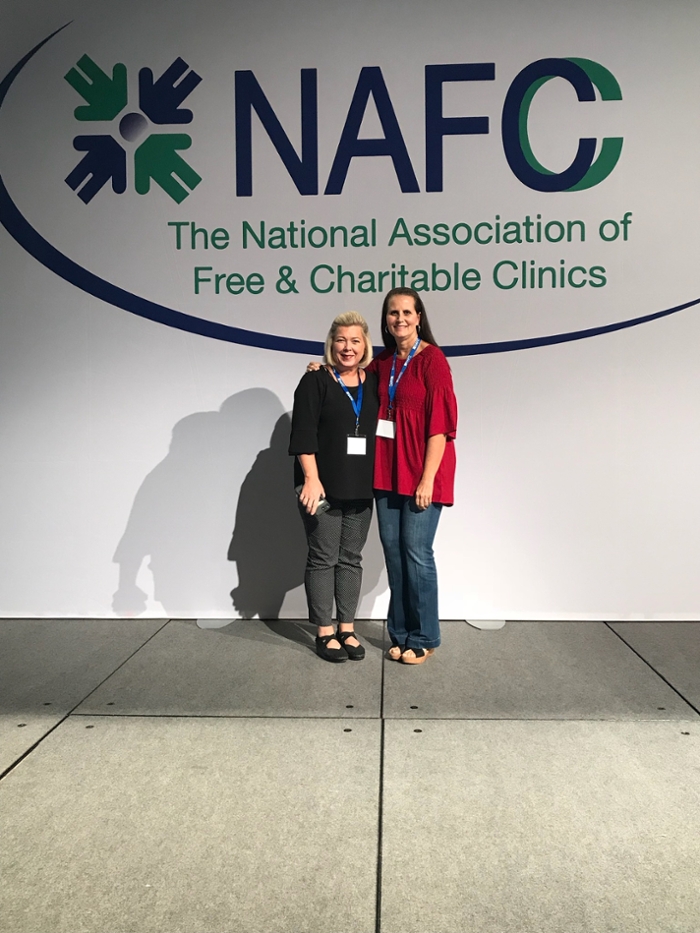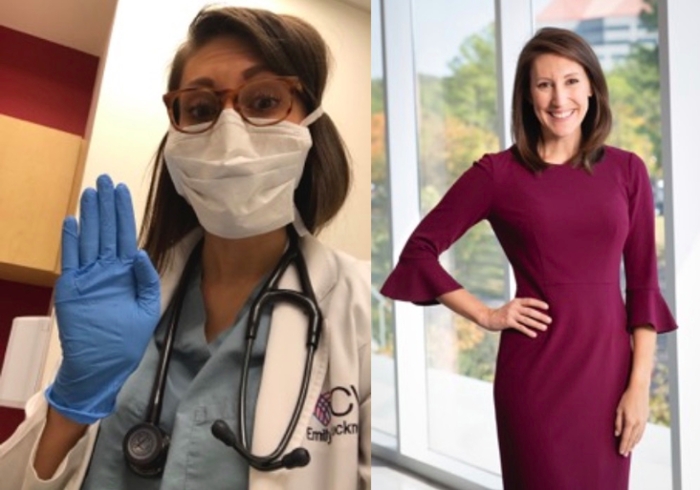
While not all nurses are working directly with COVID-19 patients in the intensive care unit, all nurses are serving in vital roles as they ensure the health and well-being of others. Regardless of the specialty or location where they serve, the realities of providing care have changed dramatically for all nurses in just a matter of weeks.
Kim Craven and Cristy Daffron, 2019 and 2012 graduates respectively, of Ida Moffett School of Nursing’s Doctor of Nursing Practice program, serve the community of St. Clair County at the St. Clair Community Health Clinic. This small, volunteer-based community clinic seeks to serve the uninsured population. In response to the COVID-19 pandemic, they have reassessed how they handle patient visits.
“Before scheduling an appointment, we assess the patient’s symptoms over the phone and try to determine the best method for a visit,” said Daffron.
The clinic is seeing patients physically in the clinic and virtually through telemedicine, but Craven and Daffron share that they are handling patient visit in the parking lot from the patient’s car when they feel it is appropriate. “By implementing these changes, we are successfully reducing the number of patients entering the clinic, and in turn, limiting each patient’s exposure to COVID-19,” said Craven.
In response to the pandemic, the clinic has also started offering curbside delivery for medications. Craven and Daffron are both serving in this effort.
 Emily Buckner, a 2013 graduate of Ida Moffett School of Nursing’s Bachelor of Science in Nursing program, serves as a nurse practitioner for Cardiovascular Associates. Prior to the COVID-19 pandemic, she covered Grandview Hospital, Brookwood Hospital, and the practice’s main clinic off highway 280; now, she is limited to only entering one hospital.
Emily Buckner, a 2013 graduate of Ida Moffett School of Nursing’s Bachelor of Science in Nursing program, serves as a nurse practitioner for Cardiovascular Associates. Prior to the COVID-19 pandemic, she covered Grandview Hospital, Brookwood Hospital, and the practice’s main clinic off highway 280; now, she is limited to only entering one hospital.
“In an effort to minimize our patient’s exposure to the COVID-19, we have designated our staff including doctors, nurses and advanced practice providers, like myself, to one location,” said Buckner.
Buckner says that in addition to the change of her location designation, she is learning to care for the unique cardiac complications that arise with COVID-19 and COVID-19 treatment modalities. After taking Plaquenil, a drug used to treat COVID-19, Buckner says she has treated several patients for QT prolongation, meaning the heart muscle takes longer than normal to recharge between beats. “Over the past few weeks, the way we treat patients recovering from COVID-19 has continued to evolve. Every day, we are learning new things about the virus and how to treat its complications,” said Buckner.
As the realities of patient care have changed, Craven, Daffron and Buckner share that they are thankful for their Ida Moffett School of Nursing training and the school’s focus on compassionate care. “In an effort to decrease foot traffic and the spread of COVID-19, family members are not allowed to visit, this leaves patients feeling alone and overwhelmed,” said Buckner. “I am thankful for the opportunity to stand in the gap as my patients’ advocate and guide each of them through decisions during their hospitalization.”
